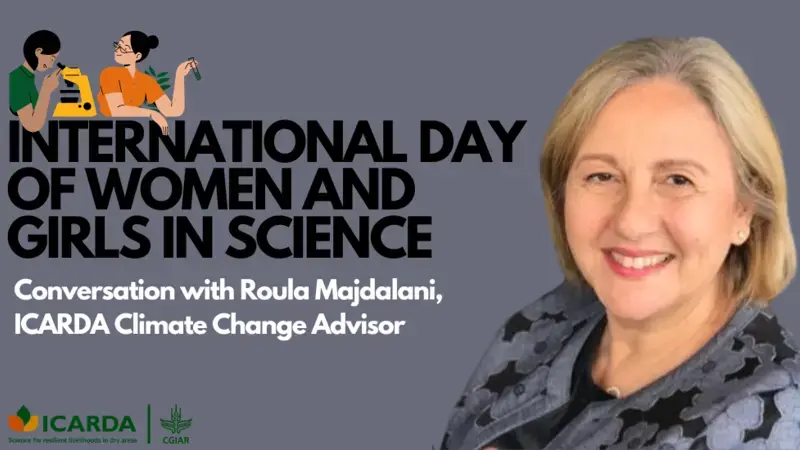Q&A With Roula Majdalani

On the 8th anniversary of the International Day of Women and Girls in Science, the United Nations (UN) aims to highlight the immense impact women in science deliver in transforming our world through contributing their knowledge and expertise towards the UN 2030 agenda and its 17 sustainable development goals.
ICARDA's Climate Change Advisor, Dr. Roula Majdalani, discusses her professional journey and contributions to climate-related agricultural science and why groundbreaking research is vital to inform policymaking that facilitates the scale-up and adoption of transformative climate-smart approaches.
- Our agricultural climate-smart innovation cannot be implemented without favorable policies. How would you say your role has influenced the value given to scientific research?
RM: Policy change is affected by economic, socio-cultural, environmental, and other external influences. For research to translate into policy, it must be contextual and relevant to the development agenda. By mobilizing accurate, relevant, and evidence-based knowledge, scientists can deliver a compelling, persuasive argument for pursuing a specific course of action that influences policymakers and practitioners. My job is to collaborate between parties by identifying opportunities in the science-policy interface, communicating the relevance of scientific information in local and international policy contexts, and synthesizing research outcomes to inform science-policy debates to strengthen the delivery of research and innovation at scale which, in turn, supports regional and global climate change mitigation and adaptation efforts.
- How would you define success in your professional life right now?
RM: Professional success is not a 'one size fits all,' and we all define it differently. I judge myself by my ability to make a difference in people's lives, especially in addressing climate impacts in this region. I equate this with the tangible output of the hard work I put into my job, the high standards I set for myself, and how that benefits my team and their definition of success, whatever it means for each of them.
- Has the definition of success for women changed throughout your career?
RM: Of course! For a woman a few decades ago, getting married and starting a family was the pinnacle of success. Accomplishment for older career women sometimes still depends on rising through the ranks of hierarchical institutions that are predominately male. On the other hand, success for younger women appears to be more about emphasizing work-life balance. All of these different definitions are equally valid. The definition of success is relative.
- Why should more women be involved in science, research, policymaking, and global efforts to address climate change?
RM: The impacts of climate change affect men and women differently, so effective climate policy requires gender balance among decision-makers. To guarantee that women's demands and what they contribute are given equal attention, locally and globally, women must participate and take the lead. This ensures that progress is made at all levels of climate governance. I am already seeing more women pursuing careers in science, research, and policy than when I began my career, and what I have seen women achieve in labs, on the field, and in conference rooms is extraordinary, especially when you consider the barriers they have routinely faced that men haven't.
- What key enablers and support systems have benefited you as a woman on your journey to success?
RM: Because I've always worked for organizations that recognize the importance of gender diversity, inclusion, and talent recognition, I count myself very lucky. The institutional tools I needed to advance my career were always provided, and I have always felt supported. But climate science is still male-dominated, and achieving recognition as an equal player requires demonstrable outcomes, which I delivered and continue to do every day.
- What practical advice would you give to women in your field to advance their careers?
RM: Success is what YOU define, but you must be persistent. Plant your seeds, nurture them, and wait for the crop. If you don't like the crop, plant new seeds!
Roula Majdalani is a Senior Climate Change Advisor, Director General Office, ICARDA. She has a long-standing career with the UN, holding different development and political portfolios in the Middle East and Africa, with extensive experience in strengthening inter-governmental collaboration on the sustainable management of natural resources with a focus on water, energy, and food security. She has served on several advisory boards for international and regional think tanks, strategically guiding development programs, resource mobilization, and partnership development.
